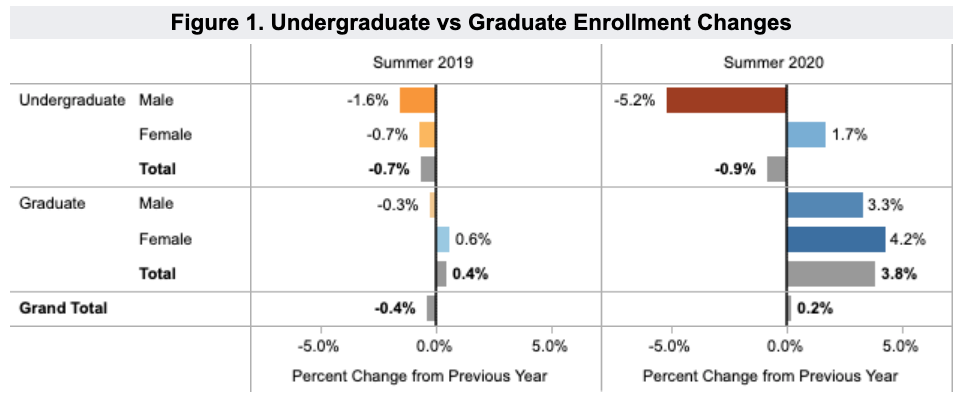- BLOG HOME
- »
- Research Services
- »
- Community Colleges, For-Profit and Rural Institutions, Black Undergraduates, Male Undergraduates S...

Community Colleges, For-Profit and Rural Institutions, Black Undergraduates, Male Undergraduates Suffered Most from Online-Only 2020 Summer Sessions
Research Center Launches New Report Series: Stay Informed with the Latest Enrollment Information
The National Student Clearinghouse Research Center recently launched a new research report series, Stay Informed with the Latest Enrollment Information, and its first report revealed that while graduate enrollment is up, undergraduate enrollment has declined, particularly, community colleges, for-profit and rural institutions, Black undergraduates, and male undergraduates suffered the most during the online-only 2020 Summer session.
This new research series will continue to track the impact of COVID-19 on postsecondary enrollments, using the latest data available throughout the academic year. The Research Center will update the data monthly, for various subgroups of students, programs, institutions, states, or regions.
“Policymakers need to pay attention to what these data show about how much higher the stakes are for disadvantaged students during disruptions like the pandemic and the subsequent recession,” said Doug Shapiro, Executive Director of the National Student Clearinghouse Research Center. “I hope this new report series will help renew policymakers’ focus on equity so that we don’t lose ground on the significant gaps in higher education access and attainment for underserved students.”
Challenges faced by students in terms of college affordability, health and family care, access to high-speed internet and devices, as well as uninterrupted time and space in which to study, all may have contributed to the reduced ability of these students to continue their studies during the summer of 2020, compared to summer 2019.
Michael Collins, Vice President of Jobs for The Future and Chair of the National Student Clearinghouse Research Center Board, noted there are many questions these declines raise that need to be addressed by policymakers and higher education leaders.
“These data give us insight into questions that we must dig into to get underneath the calculations the students made that are reflected in the data,” Collins said. “One important area of inquiry is the mix of programs that declined in enrollments. If the declines were in programs that lead to immediate employment in high wage jobs, this is a huge problem that needs urgent attention.
“If on the other hand the declines were in programs that, suddenly, no longer lead to good quality jobs then they may be the result of students pivoting, for good reasons, to other career plans. In addition, the graduate increases of Black and Latinx students are an important story line that raises other questions about economic opportunity and advancement for students of color.”
The research raises fears for the fall for many institutions and policymakers who are concerned about the most impacted students. Even though the report does not address the reasons for the enrollment shifts, clearly there were some very large disparate impacts to the effects of the pandemic, the recession, and the racial unrest.
“We, in higher education, have a responsibility to foster communities where we educate students from each walk of life from pre-application to post-graduation,” said Dr. Monty Sullivan, President of the Louisiana Community & Technical College System and Board Chair of the National Student Clearinghouse. “While the data in the report can help institutional leaders understand who is being served well, it also places into perspective who is being left out of educational attainment success. Institutions can develop strategies and provide experiences in which each individual student can reach their dreams, hopes, and aspirations.”
To further help institutions support students and quantify the impact of COVID-19 on U.S. higher education, the Research Center, with financial grants from Ascendium Education Group and the ECMC Foundation, will launch on October 27 a new research report series titled, “COVID-19: Transfer, Mobility, and Progress,” that addresses the student transfer behaviors that may be underlying the shifting enrollment numbers.

“I hope this new report series will help renew policymakers’ focus on equity so that we don’t lose ground on the significant gaps in higher education access and attainment for underserved students.”
Doug Shapiro
Executive director, National Student Clearinghouse Research Center



